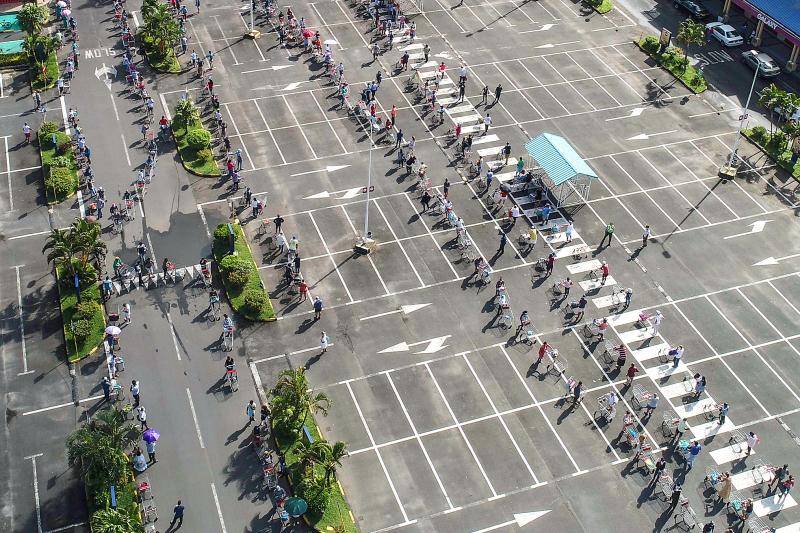Mauritius on Wednesday declared a wary victory in its first battle with COVID-19, saying that it had “zero” coronavirus patients and had not documented a new case in 17 days.
The Indian Ocean nation initially surged ahead of other eastern African countries in terms of cases, hitting a peak of 332 at almost six weeks into its outbreak — 10 people died.
The nation imposed one of the first and strictest lockdowns in Africa, going so far as to initially shut supermarkets for 10 days, a measure that has been extended until June 1.

Photo: AFP
“Today, we are at 17 days without a new case. Mauritius now has zero active cases,” Mauritian Minister of Health and Wellness Kailesh Jagutpal said in an address on national television. “We have won the battle thanks to the cooperation of the public, who understood that the government needed to take extreme measures, including complete confinement, and the closure of supermarkets and our borders. But we have not yet won the war. Let’s remain vigilant.”
From today, a limited selection of essential stores such as bakeries, butcheries and fishmongers are to be reopened, but most businesses, bars, shopping centers and markets are to remain shut.
Schools are to remain closed until Aug. 1, the nation’s beaches are to remain off limits, and no more than 10 people are to be allowed to attend weddings and funerals.
Independent epidemiologist Deoraj Caussy said that Mauritius needs to remain on alert.
“It is imperative to use random sampling and continue to test... Zero active cases does not mean that it is over and life is returning to normal,” Caussy said.
The government is busy debating two pieces of legislation — the COVID bill and the quarantine bill — which would legislate aspects of the eventual lifting of the lockdown and planned return to normal of all activity from June 2.
However, the laws have come under fire from unions and member of the public who say that they weaken individual freedoms and workers’ rights.
Among the changes considered are those that would allow employers to fire workers with one month’s salary and on short notice, while another change would allow police to enter a home without a warrant.
A statement from a collective of unions in the country warned that social discontent remains confined, but that it “could erupt like a social volcano at any moment.”
“We still need to make sacrifices to return to a semblance of normalcy,” Mauritian Attorney General and Minister of Agro-Industry and Food Security Maneesh Gobin said. “We are counting on the understanding of the population to not let their guard down.”

DOUBLE-MURDER CASE: The officer told the dispatcher he would check the locations of the callers, but instead headed to a pizzeria, remaining there for about an hour A New Jersey officer has been charged with misconduct after prosecutors said he did not quickly respond to and properly investigate reports of a shooting that turned out to be a double murder, instead allegedly stopping at an ATM and pizzeria. Franklin Township Police Sergeant Kevin Bollaro was the on-duty officer on the evening of Aug. 1, when police received 911 calls reporting gunshots and screaming in Pittstown, about 96km from Manhattan in central New Jersey, Hunterdon County Prosecutor Renee Robeson’s office said. However, rather than responding immediately, prosecutors said GPS data and surveillance video showed Bollaro drove about 3km

Tens of thousands of people on Saturday took to the streets of Spain’s eastern city of Valencia to mark the first anniversary of floods that killed 229 people and to denounce the handling of the disaster. Demonstrators, many carrying photos of the victims, called on regional government head Carlos Mazon to resign over what they said was the slow response to one of Europe’s deadliest natural disasters in decades. “People are still really angry,” said Rosa Cerros, a 42-year-old government worker who took part with her husband and two young daughters. “Why weren’t people evacuated? Its incomprehensible,” she said. Mazon’s

‘MOTHER’ OF THAILAND: In her glamorous heyday in the 1960s, former Thai queen Sirikit mingled with US presidents and superstars such as Elvis Presley The year-long funeral ceremony of former Thai queen Sirikit started yesterday, with grieving royalists set to salute the procession bringing her body to lie in state at Bangkok’s Grand Palace. Members of the royal family are venerated in Thailand, treated by many as semi-divine figures, and lavished with glowing media coverage and gold-adorned portraits hanging in public spaces and private homes nationwide. Sirikit, the mother of Thai King Vajiralongkorn and widow of the nation’s longest-reigning monarch, died late on Friday at the age of 93. Black-and-white tributes to the royal matriarch are being beamed onto towering digital advertizing billboards, on

POWER ABUSE WORRY: Some people warned that the broad language of the treaty could lead to overreach by authorities and enable the repression of government critics Countries signed their first UN treaty targeting cybercrime in Hanoi yesterday, despite opposition from an unlikely band of tech companies and rights groups warning of expanded state surveillance. The new global legal framework aims to bolster international cooperation to fight digital crimes, from child pornography to transnational cyberscams and money laundering. More than 60 countries signed the declaration, which means it would go into force once ratified by those states. UN Secretary-General Antonio Guterres described the signing as an “important milestone,” and that it was “only the beginning.” “Every day, sophisticated scams destroy families, steal migrants and drain billions of dollars from our economy...